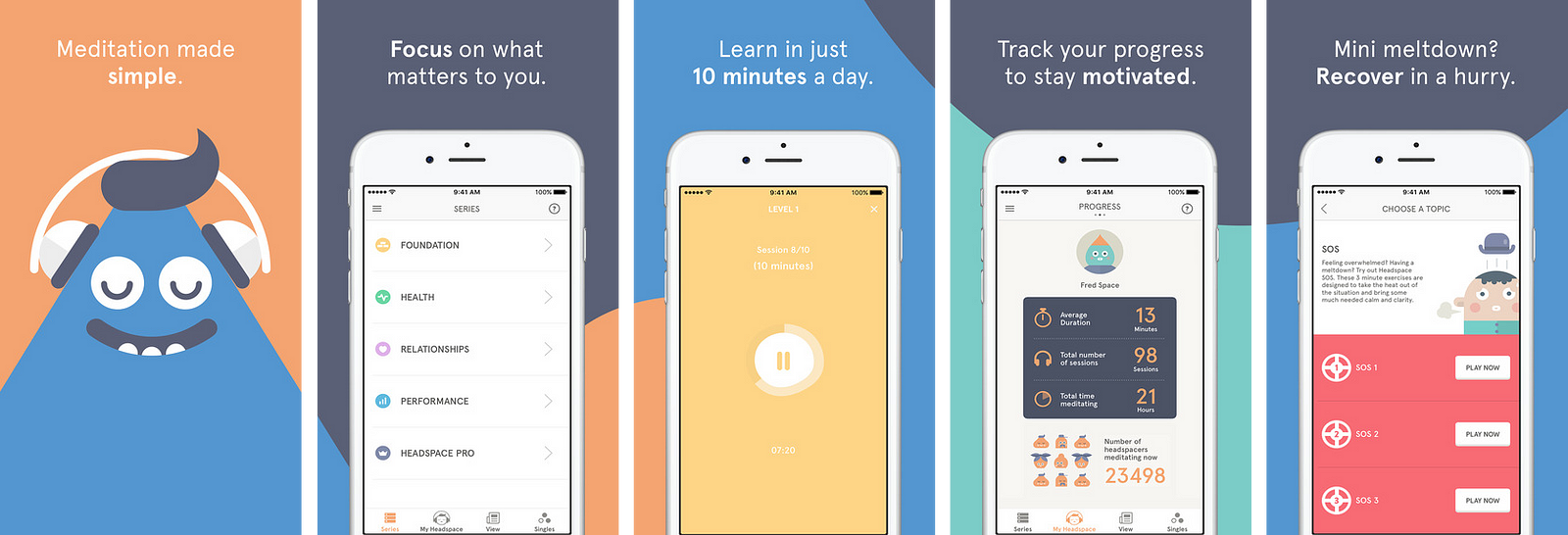6 MORE Free Mental Health Apps that Could Help with your Recovery

Since there are always more free mental health apps to be found, we expanded this article, which mentions 5 other mental health apps. In recent years there has been a lot of research into the relationship between, and possibilities for combining mental health and technology. Many mental health workers use so called ‘eHealth’ programmes focused on specific problems. Most of these are only accessible through professionals or cost money, but we have found some great free mental health apps for you to try out.
Disclaimers: Most of the free mental health apps named in this article are indeed free of charge at the time of publication, but we cannot guarantee that this is still the case at the time of reading this. Most are completely free, others are free with an option for paid expansion. In any case, we hope you get something out of these free mental health apps.
-
Headspace (Android, iPhone)

Headspace is focused on different kinds of exercises to help you manage your anxiety and other symptoms. It focuses a lot on guided meditation in helpful steps for those who have never tried it before. They offer exercises with a lot of different themes and with different age groups in mind.
Plus: Clear explanation, professional, clean, good build up in ‘level’ of exercises.
Doubts: Free content is limited.
-
PTSD coach (Android, iPhone)

This free mental health app is made with veterans and the military service in mind, but is made in such a way that anyone with PTSD symptoms can use it. It allows you to both practise coping skills as well as read up on PTSD facts and symptoms.
Plus: it has many different functions, from tracking symptoms to PTSD facts and coping skills.
Doubts: The app does not have many customization options.
-
SAM: Self-help Anxiety Management (Android, iPhone)
 This app was constructed by research from the university of the West of England, and provides the user (that’s you!) with both immediate help and exercises for emergencies, as well as things to help you in the long run. You can use sliders to track your mood, which the app will turn into handy charts you can use to see if there’s a pattern in your anxiety.
This app was constructed by research from the university of the West of England, and provides the user (that’s you!) with both immediate help and exercises for emergencies, as well as things to help you in the long run. You can use sliders to track your mood, which the app will turn into handy charts you can use to see if there’s a pattern in your anxiety.
Plus: functions for different situations, and the graph function is handy.
Doubts: some functions require some getting used to but once that’s done, they’re very useful.
-
MoodTools: Depression Aid (Android, iPhone)

The MoodTools free mental health app was made specifically with depression in mind. There is also an anxiety variety of the app. It helps you track symptoms and contains a list of videos with explanation or calming exercises.
Plus: The app has a good focus on depression. It helps you create a safety plan for yourself for emergencies, which is always good to have as a backup.
Doubts: not much variety in the help videos, a lot of them are somewhat similar.
-
CBT: Thought Record Diary (Android, iPhone)

This is a diary0-style free mental health app that is focused on working through distorted thoughts with the help of CBT. CBT stands for cognitive behavioural therapy, a type of therapy that revolves around the connections between your behaviour, your thoughts about those behaviours and the feelings related to all of those. It’s aimed at breaking unhelpful patterns in thoughts, feelings and behaviours.
Plus: This app is a good first step into practising with commonly used psychology treatments, and is based on well researched methods.
Doubts: CBT: Thought Record Diary is not the most versatile app in this list, it doesn’t have many other functions. Does what it says on the tin, but that’s about all it does.
-
MoodPanda (iPhone)

This app also provides useful mood tracking functions that turns your data into easy-to-read graphs. It even gives you different types of graphs, from circles to linear graphs. It can calculate your average mood too. Apart from this, it also allows people to use an anonymous name, and provide support to each other.
Plus: The anonymous support function is very nice, although it is not 100% clear how it is moderated.
Doubts: The mood tracker and it’s graphs are limited to a scale of how happy/ok/unhappy you are, which seems to be an oversimplification.
Are there any other topics you would like psych2go to delve into? Let us know in the comments or on facebook or tumblr.
More from us:
What is your best personality trait? QUIZ
11 sleeping tips for people with anxiety



I have chosen, Self-Help Anxiety management app, thank you
I use Headspace and Calm. Wonderful apps
Love Headspace, but it is really limited with the free options and it seems to have gotten really expensive recently. There’s a great new app from Anxiety BC called MindShift™ CBT you should check out!
We’d also love to know your thoughts on our mental health apps, Kayleigh – we focus on therapeutic photography, provide free access to anyone who can’t afford it and everything is private for members-only by default.